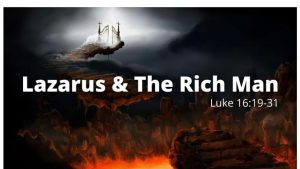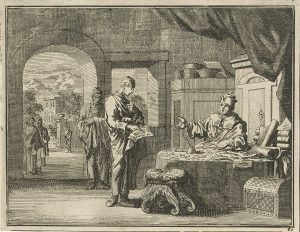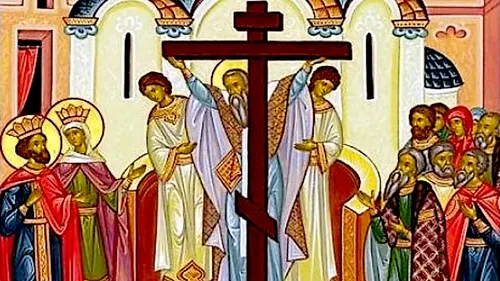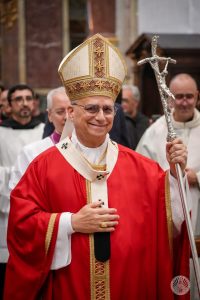We see so many hungry families around us every day, yet we know our land is rich. The problem is not lack of blessings from God, but lack of fairness in sharing. Many politicians and government officials are plunderers. Millions of impoverished citizens deprive of what is rightfully theirs.
Today’s readings for the 26th Sunday in Ordinary Time Year C reminds us to care about others.
In the first reading from the Book of Amos, a prophet had spoken against injustice in Israel. It has a theme on social justice where God demands concern for the plight of the poor. The prophet Amos condemns those living in comfort while ignoring the suffering of others. If we don’t do anything to care for others, our faith is empty and our worship has no value because of our attitude to oppress others.
However, God doesn’t free us from our responsibility and accountability. Like Israelites, if we failed to live righteously, because of our selfishness and neglect for the needy, we cannot escape divine judgment.
In the 2nd reading taken from the Letter of St. Paul to Timothy, he urges Timothy to live faithfully, and live a holy life as a servant of God. St. Paul encourages us to embrace Christian virtues of faith, love and patience which are necessary to build characters of being good leaders. As leaders we must not be distracted by material wealth but God’s sovereignty for He gives generously to us. Whatever God gifted us, we too remember that we are entrusted others under our care.
In the gospel Jesus tells the parable of the Rich Man and Lazarus, where a wealthy man ignored the needs of a poor man every day. We are challenge to reflect on our present lives in the light of eternal values and the after-life.
We are invited to discern seriously these important lessons on Jesus’ parable contrasting a rich man’s luxurious life with Lazarus, a destitute man.
First, on this parable Jesus warns against ignoring the poor which is the recurring theme in the writing of St. Luke. that runs throughout Luke’s Gospel. This evangelist highlights God’s concern for the marginalized, the poor and destitute which challenges those who want to follow the Lord generously and humbly.
As Catholics, we need to fulfill the following tasks: to proclaim the gospel by words and action, to love and adore God through loving and caring for the poor. worshipping God, and caring for the poor.
This parable challenges every believers to reflect on their responsibility towards those in need, urging concrete actions to embody our faith. For we know that having faith without action is dead.
Second, after death, there is reversal, Lazarus found comfort with Abraham, while the rich man suffered. This parable reminds the overwhelming eternal consequences of what we have done here on earth.
There is an importance of time as to our most valuable resource, wants to use it wisely for repentance and making right choices.
Believing in Jesus’ resurrection as the ultimate sign of eternal life and the reality according to our choices can be the reason of putting chasm or being eternally separated from God. Thus, living a life faithful to follow His will to avoid the experience of suffering like the destiny of the rich man. due to our choices.
Third, in the parable, the rich man’s plea for relief and a warning for his brothers was denied because Moses and the prophets teaching is enough and not to be ignored.
We have scriptures and the guidance of the Church. We need not to wait for signs and seek for them, instead to listen to His words and living it out in live for our fellowmen.
When talking about the rich man and Lazarus, in our modern times, we may think about Lazarus today could be the street child begging for money and food, the sick neighbor we ignore, our house helpers we abuse, the elderly who feel abandoned.
It is also possible that the rich man could be us, when we focus only on our comfort—our gadgets, food, and travels—without noticing the need right outside our door.
Let us heed the stern warning that those living lavish life-style, comfortably unmindful of ones neighbors, indifferent to those people right in-front of our gate seeking help from is but doing nothing for them, clearly complacent of others sufferings connecting with God is extremely impossible. Let us not pass by our ‘Lazarus.’ Who is the person at your gate? A family member? A neighbor? A co-worker?
Always remember that the rich man was not condemned for being rich but for being indifferent. Well, think that the greatest joy comes not from what we have, but from what we give. Thus, we seek transformation for what God seeks for us, a life where we are truly rich in mercy and compassion.
God bless you.
Fr. Arlon, OSA
—————
El Dictado del Corazón: Vigésimo Sexto Domingo del Tiempo Ordinario, Ciclo C
- Amós 6,1.4-7
- Salmo 145,7.8-9.9-10
- 1 Timoteo 6,11-16
- Lucas 16,19-31
Vemos tantas familias con hambre a nuestro alrededor todos los días, y sin embargo sabemos que nuestra tierra es rica. El problema no es la falta de bendiciones de parte de Dios, sino la falta de equidad al compartir. Muchos políticos y funcionarios del gobierno son saqueadores. Millones de ciudadanos empobrecidos son privados de lo que les pertenece.
Las lecturas de hoy, para el Vigésimo Sexto Domingo del Tiempo Ordinario, Ciclo C, nos recuerdan la importancia de preocuparnos por los demás.
La primera lectura del profeta Amós, se habla en contra de la injusticia en Israel. Es un llamado a la justicia social donde Dios exige preocupación por la situación de los pobres. El profeta Amós condena a aquellos que viven cómodamente mientras ignoran el sufrimiento de otros. Si no hacemos nada por cuidar de los demás, nuestra fe está vacía y nuestro culto pierde su valor debido a nuestra actitud opresora.
Sin embargo, Dios no nos libera de la responsabilidad ni de rendir cuentas. Al igual que los israelitas, si no vivimos con rectitud, si somos egoístas y descuidamos al necesitado, no podremos escapar del juicio divino.
En la segunda lectura, tomada de la Carta de San Pablo a Timoteo, San Pablo lo exhorta a vivir con fidelidad y santidad como siervo de Dios. Nos anima a abrazar las virtudes cristianas de la fe, el amor y la paciencia, que son necesarias para formar el carácter de buenos líderes. Como líderes, no debemos dejarnos distraer por las riquezas materiales, sino confiar en la soberanía de Dios, pues Él nos da generosamente. Todo lo que Dios nos ha concedido, también implica que somos responsables de quienes están bajo nuestro cuidado.
En el evangelio, Jesús nos cuenta la parábola del hombre rico y el pobre Lázaro, donde un hombre adinerado ignoraba las necesidades de un pobre que veía todos los días. Esta parábola nos desafía a reflexionar sobre nuestra vida presente a la luz de los valores eternos y la vida después de la muerte.
Estamos invitados a discernir seriamente estas lecciones tan importantes en la parábola de Jesús que contrasta la vida lujosa de un rico con la miseria de Lázaro.
Primero, Jesús nos advierte sobre la indiferencia hacia los pobres, un tema recurrente en el Evangelio de San Lucas. Este evangelista resalta la preocupación de Dios por los marginados, los pobres y los necesitados, y lanza un desafío a quienes desean seguir al Señor con generosidad y humildad.
Como católicos, debemos cumplir con estas tareas: proclamar el evangelio con palabras y acciones, amar y adorar a Dios amando y cuidando a los pobres. Adorar a Dios y servir a los necesitados van de la mano.
Esta parábola nos reta a todos los creyentes a reflexionar sobre nuestra responsabilidad hacia quienes lo necesitan, motivándonos a actuar concretamente para encarnar nuestra fe. Porque sabemos que la fe sin obras está muerta.
Segundo, después de la muerte hay un cambio radical: Lázaro encontró consuelo con Abraham, mientras el rico sufría. Esta parábola nos recuerda las consecuencias eternas de nuestras acciones aquí en la tierra.
El tiempo es nuestro recurso más valioso. Dios quiere que lo usemos sabiamente para el arrepentimiento y para tomar decisiones correctas.
Creer en la resurrección de Jesús como el signo definitivo de la vida eterna nos invita a vivir de acuerdo con sus enseñanzas, para no crear un abismo entre nosotros y Dios por nuestras malas decisiones. Vivir fielmente según su voluntad es evitar el destino de sufrimiento que tuvo el hombre rico.
Tercero, en la parábola, la súplica del rico para que sus hermanos fueran advertidos fue negada, ya que las enseñanzas de Moisés y los profetas eran suficientes y no debían ser ignoradas.
Hoy también tenemos las Sagradas Escrituras y la guía de la Iglesia. No necesitamos esperar señales ni buscarlas, sino escuchar su Palabra y vivirla en amor hacia nuestros hermanos.
Cuando hablamos del rico y de Lázaro en nuestros tiempos modernos, pensemos que Lázaro puede ser el niño de la calle que pide comida, el vecino enfermo que ignoramos, los empleados del hogar a quienes maltratamos, o el anciano que se siente abandonado.
Y también es posible que el rico seamos nosotros, cuando solo nos enfocamos en nuestra comodidad, nuestros celulares, comida y viajes, sin notar la necesidad justo afuera de nuestra puerta.
Prestemos atención a la seria advertencia: quienes viven una vida lujosa, cómodamente, sin pensar en sus vecinos, indiferentes a las personas que tocan su puerta pidiendo ayuda y no hacen nada por ellas, claramente están desconectados de Dios. Conectar con Dios en esas condiciones es prácticamente imposible.
No pasemos de largo a nuestro “Lázaro”. ¿Quién es esa persona en tu puerta? ¿Un familiar? ¿Un vecino? ¿Un compañero de trabajo?
Recordemos siempre que el hombre rico no fue condenado por ser rico, sino por ser indiferente. Pensemos que la verdadera alegría no viene de lo que tenemos, sino de lo que damos. Por eso buscamos una transformación: lo que Dios desea para nosotros es una vida donde seamos verdaderamente ricos en misericordia y compasión.
Dios los bendiga.
P. Arlon, OSA




